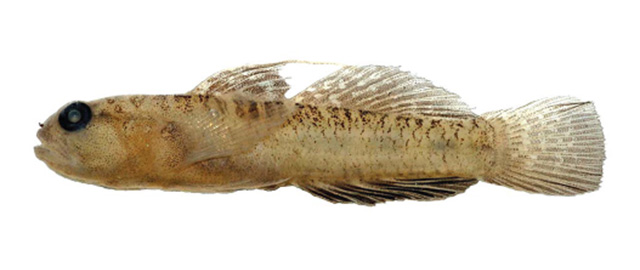| Gobiidae (Gobies), subfamily: Gobiinae |
| 2.1 cm SL (male/unsexed); 1.7 cm SL (female) |
|
benthopelagic; marine; depth range 0 - 29 m |
| Southwest Pacific: New Zealand (Kermadec Islands). |
|
Dorsal spines (total): 7-7; Dorsal soft rays (total): 9-10; Anal spines: 1-1; Anal soft rays: 8-9; Vertebrae: 26-26. This species is distinguished from its congeners by the following set of characters: D usually VI + I,10; A usually I,8; most pectoral-fin rays branched; cephalic sensory-pore system pattern 1 (terminal lateral canal pore present); males with first dorsal spine filamentous, base of pectoral fin with 2 spots (darker than body color or much lighter than body color), lower spot usually smaller than upper and sometimes obscure; 4 segmented pelvic-fin rays plus a rudimentary fifth ray present, pelvic rays partly separated, connected about one-third to one half between segmented rays 2-4 and almost completely connected to tip between spine and first ray; rudimentary fifth pelvic ray bound in membrane to fourth ray; subcutaneous bars on lower trunk behind anus usually lacking in preserved adults; nasal tubes short, tips of tubes with thin black ring, dorsal, anal and caudal fins usually grey to black; dorsal fin with some light spots; vertebrae usually 26 (Ref. 93112). Dorsal to anal fin-ray formula 10/8 (Ref. 116739). |
| Found in rocky reefs (Ref. 93112). |
|
Least Concern (LC); Date assessed: 29 June 2018 Ref. (130435)
|
| harmless |
Source and more info: www.fishbase.org. For personal, classroom, and other internal use only. Not for publication.

